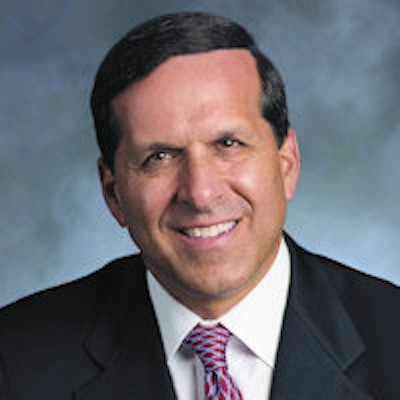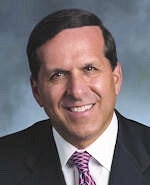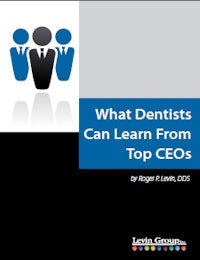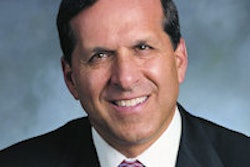
In his recent book, What Dentists Can Learn from Top CEOs, Dr. Roger P. Levin describes a wide range of effective techniques used by corporate leaders and explains how these approaches can be applied successfully in dental practices. Following is an excerpt from the chapter entitled "CEOs Have Emotional Intelligence."
Like so many people, I first learned about emotional intelligence in Daniel Goleman's book by that name. It has to do with people's ability to read and control emotions in themselves and others. I find the concept of emotional intelligence useful as a way of helping dentists understand and manage their relations with others -- staff, patients, vendors, and other doctors. This skill can have a tremendous influence on the success of the practice and also dentists' enjoyment of their profession.
Personality testing
 Roger P. Levin, DDS, chairman and CEO of practice management consulting firm Levin Group.
Roger P. Levin, DDS, chairman and CEO of practice management consulting firm Levin Group.To function effectively as a CEO, a dentist must have a high level of emotional intelligence and be able to use it to encourage the best staff behavior. The key is to understand different personalities and know how to use emotional intelligence to motivate them successfully.
The personalities of practice team members are not good or bad -- just different from each other. Levin Group has certified personality testing experts on staff who assess the dental team members during the second phase of our management consulting program. We wait until the second year, so that the new systems will be in place and the practice team will be operating them effectively regardless of the personalities involved. This way, we get a clear picture of the individual's nature without the stress, fatigue, and other distortions caused by inefficient business systems.
In personality assessments, dentists typically score very low for sales. This is why case acceptance is not higher. On the other hand, dentists score high on the research/technical side of the scale.
Fortunately, many dental team members score very high on the sales side. Given this information, the dentist as CEO will know to involve more staff members in the case presentation and acceptance processes to increase the percentage of cases accepted.
I have never seen any studies relating the level of emotional intelligence to a particular personality type. A research/technical personality can have high emotional intelligence and a sales-oriented personality can have low emotional intelligence. The point is to recognize that whatever the personality, it can be modified in its day-to-day behavior.
Initiation of communication
 What Dentists Can Learn From Top CEOs by Dr. Roger P. Levin.
What Dentists Can Learn From Top CEOs by Dr. Roger P. Levin.When initiating communication, it is important to take a moment to think about what is being communicated, how it will be communicated and what reaction is desired. There are people who spend their lives continually shooting themselves in the foot. They do not give any thought to what they say and sometimes excuse it by saying, "I'm only being honest." In one of the courses I attended, the instructor said this was the same as saying, "I'm only being obnoxious."
Thinking like a CEO, the dentist is always totally aware of the objective of communication -- and how to achieve it. Look at communicating with staff, for example. We know that team members want to be appreciated, recognized, and praised. But we also realize that there are times when they need to be judged and corrected. Here are examples of what the dentist might say, with and without emotional intelligence:
Without: "You're obviously incompetent. You're doing a terrible job!"
With: "That job could have been handled differently. Let's look at some alternative ways to meet the specific objectives."
You can easily see the contrast between the two approaches -- and imagine how different the reactions would be. Without emotional intelligence, the dentist generates fear (of being terminated), anger, and resentment. With emotional intelligence, the dentist projects concern without laying blame and is clearly focused on working together to find a solution. This approach is unlikely to get a defensive or resentful reaction.
Reaction to communication
The second aspect involves how an individual reacts to communication. Complaints from patients, bad news from staff, critiques from outside experts -- all can trigger a negative reaction by the dentist. If a sense of resentment, annoyance, or constant defensiveness develops, the dentist can make the workday miserable for practice team members, who will look for jobs elsewhere.
The way a person reacts and responds to communication from others is a major part of emotional intelligence. Many people respond far too quickly, not thinking about the real meaning of the communication or what the response should be. Pausing for a moment, thinking it over for a few minutes or even sleeping on it before responding can be extraordinarily beneficial. It can prevent a response that would worsen the situation.
Roger P. Levin, DDS, is the chairman and CEO of practice management consulting firm Levin Group.
Special for DrBicuspid.com members
The digital version of What Dentists Can Learn from Top CEOs is now available online for $29.99.
Seminar savings: Save $100 on any two-day seminar by Dr. Levin when you register 30 days in advance. Choose your seminar and get your savings here.
The comments and observations expressed herein do not necessarily reflect the opinions of DrBicuspid.com, nor should they be construed as an endorsement or admonishment of any particular idea, vendor, or organization.
Copyright © 2015, Levin Group, Inc. Reprinted with permission.


















